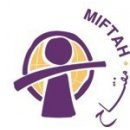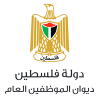إعداد دراسة بحثية حول التحديات التي تواجه ممارسة الحقوق الرق...
الموضوع: طلب عرض سعر للتعاقد مع خبير/ة لإعداد دراسة بحثية حول التحديات التي تواجه ممارسة الحقوق الرقمية في فلسطين بالاستناد إلى الحقائق.
ترغب "مفتاح" ضمن تدخلاتها في مشروع (ReCIPE) وبالشراكة مع مؤسسة أوكسفام بالتعاقد مع خبير/ة لإعداد دراسة بحثية حول التحديات التي تواجه ممارسة الحقوق الرقمية في فلسطين بالاستناد إلى الحقائق.
وعليه، نرجو تزويدنا بعرضكم الفني والمالي لإعداد التقرير وفقاً للإطار المرجعي المرفق في موعد أقصاه يوم السبت الموافق 25/05/2025 على البريد الإلكتروني: [email protected] حسب التالي:
العرض الفني بما يشمل:
- السيرة الذاتية مع تسليط الضوء على الخبرات السابقة في المجال وبما يعكس توفر الشروط المذكورة.
- المنهجية والإطار الزمني.
- نموذج لدراسة أو تقرير سابق أعده المستشار في سياق مشابه لما هو مطلوب.
- تحديد لغة إعداد التقرير (حيث ستقوم المؤسسة بترجمة التقرير بعد الانتهاء من إعداده من خلال المترجم المعتمد لديها، نظراً لاهتمام المؤسسة بتوفيره بالغتين (العربية والإنجليزية).
العرض المالي بعملة اليورو بما يشمل عدد أيام العمل وتكلفة اليوم الواحد شامل لضريبة الدخل حسب القانون الفلسطيني والبالغة 10% وحال مشتغل مرخص يرجى تزويدنا بالسعر غير شامل ضريبة القيمة المضافة كون المشروع معفياً من الضريبية بالإضافة إلى شهادة خصم مصدر.
لمزيد من المعلومات أو الاستفسارات الرجاء الاتصال على هاتف المؤسسة رقم 2989490/1، أو على البريد الإلكتروني [email protected]
وتفضلوا بقبول فائق الشكر والاحترام،
التفاصيل بصيغة PDF
Advertismen190524t.pdf (miftah.org)
May 2024
Terms of Reference
Evidence-based research on Access to Internet in the West Bank and Gaza.
ReCIPE (2024)
In 2021, MIFTAH launched its digital and public diplomacy plan aiming to widen the outreach scope of global influencing in support of the Palestinian cause. This goes in line with MIFTAH’s mission to engage local and international public opinion and official circles on the Palestinian cause, as a platform for the dissemination of the Palestinian narrative. MIFTAH adopts the flow of information (dissemination of data) as a strategic advocacy tool at the national and international levels, relying on documentation of human rights violations and the analysis of the gendered impact of the Israeli occupation policies and practices on the Palestinian civilians in Occupied Palestine.
MIFTAH works within the framework of human rights mainly International Humanitarian Law, International Covenants of Human Rights, the International Human Rights Law, Rome Statute of the International Criminal Court, Geneva Convention, and the relevant UN resolutions capitalizing on its Consultative Status with the ECOSOC.
Since October 7th, 2023, during the continued Israeli genocide war on Gaza and the escalation of Israeli military raids on refugee camps in the West Bank, settlers' terrorist and violent attacks have targeted Palestinian villages and cities. These Israeli atrocities, war crimes, and violations have been publicly shared on a global level through social media and digital campaigns led mainly by youth, journalists, media producers, influencers, content creators, and human rights defenders in Palestine. These campaigns have been widely spread by global networks, solidarity movements, university students, and celebrities. This global action, geared via digital campaigning and advocacy, has enhanced public opinion to stand in solidarity with the Palestinians' right to self-determination and freedom.
During 2024, MIFTAH is leading actions towards enhancing the civic space through conducting evidence-based research on Access to Internet in the West Bank and Gaza. The research will cover Israeli occupation restrictions and gaps in the internet infrastructure due to discriminatory regulations with focus on violations and restrictions that were widely witnessed after the 7th of October in the West Bank and Gaza Strip. The research will cover Israeli restrictions, destructions, and gaps in the internet infrastructure due to the occupation, with focus on the impact of the genocide war and the military raids on Palestinian digital rights and cyber security, in addition to restriction on access to internet by the PA.
MIFTAH’s aim of the research is to provide evidence that can support: 1) CSOs to advocate for the protection of the Palestinian digital rights under occupation through data Protection, Cybersecurity, and information Literacy, 2) addressing needed national policy reform to ensure freedom of expression and access to information, 3) leading advocacy campaign on the international level for the protection of Palestinian human rights defenders and CSOs facing violations of their rights by the Israeli occupation, and 4) engaging in international digital rights fora and debates to highlight the specificities of digital rights witnessed by “global south”
The framing of the research
- Israeli Control Over Palestinian Resources
This section will highlight the control exercised by the Government of Israel over Palestinian resources, with a specific focus on digital infrastructure. The emphasis will be on the situation in Gaza considering the genocide war, as well as the challenges Palestinians face in exercising their digital rights in Jerusalem and marginalized areas like "Area C," which faces the imminent risk of confiscation.
- Restrictions on Civic Space
This section will examine the limitations and restrictions imposed on the civic space within the occupied Palestinian territory by both the Israeli government and the Palestinian Authority. It will explore how these constraints affect freedom of expression, assembly, and association for Palestinians.
- Smear Campaigns Against Human Rights Defenders
This section will investigate the targeted smear campaigns conducted by the Israeli occupation against human rights defenders and CSOs in Palestine. It will detail the methods and impacts of these campaigns on the individuals and organizations involved.
- Limitations of National Legislation
This section will analyze the limitations of national legislation in protecting citizens' digital rights and freedom of expression. It will identify gaps in cyber security laws and procedures, and their implications for Palestinian society.
- International Human Rights Obligations
This section will discuss the international human rights obligations relevant to the Palestinian context, including conventions on human rights, international humanitarian law (IHL), international human rights law (IHRL), and the EU human rights treaty. It will cover issues such as the conflict in Gaza, settler violence and terrorist attacks in the West Bank, military escalation in refugee camps, night raids on cities and villages, the apartheid regime, and the disproportionate impact on Palestinians, including those in Jerusalem.
- Intersectional and Gendered Impact Analysis
This section will provide an intersectional analysis, focusing on the gendered impact of inadequate internet infrastructure on human rights as denied by the Israeli occupation. It will examine how these deficiencies disproportionately affect different groups within Palestinian society, particularly women and marginalized communities.
Methodology:
- Desk review- literature review including political analysis of the Palestinian context in relation to civic space, digital rights and smear campaigning lead by Israel ( the occupation dominant power) and the PA
- Legal analysis of international conventions including IHL, HR covenants with EU human rights treaties and measures.
- Examination and analysis of the gaps within local and national legislation related to digital rights and rights of expression.
- Conduct individual interviews with identified relevant Palestinian CSOs, official institutes and the private sector (internet providers)
- Conduct focus groups with human rights defenders and youth influencers and advocates, facing challenges in exercising their digital rights.
- Collecting evidences in terms of statistics, figures, and individual cases ( of persons or organizations)
- Reflecting on data analysis and collected data in a matrix highlighting on level of violations and gaps in protection measures to ensure proper exercise of digital rights in occupied Palestine within the specified framing of the research.
- Developing a fact sheet with main findings and results with proposed recommendation at the international level and reforms at the national level.
Profile of the researcher/ research team:
- Field of Specialty (digitization and human rights)
- High level knowledge of national legislation and international treaties and conventions related to digital rights.
- Proven interest in research work, especially in the field of digitization and human rights
- Good understanding of the Palestinian political context
- Strong organizational and planning skills.
- Documented and published research papers in the field of digitization and human rights.
- Proven experience in the related field.
- Familiar with the work field and interventions of Palestinian CSOs, coalitions, official institutions, and private sector.



















